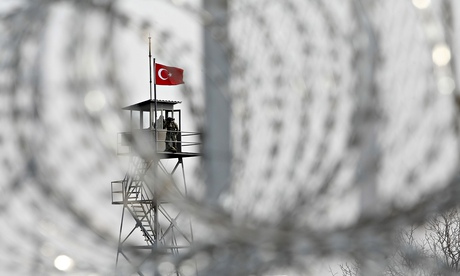Helena Smith in Athens The Guardian, Thursday 20 February 2014
Scheme unveiled by British embassy in Athens as part of efforts to stem flow of immigrants to UK
Greece has also built a security fence along its land border with Turkey in an effort to stem the flow of migrants into Europe. Photograph: Nikos Arvanitidis/Corbis
The British government has launched a £2m project in Greece to assist the repatriation of migrants to countries in Africa, Asia and the Middle East, as it emerged that 18,500 had voluntarily left since the onset of the Greek debt crisis.
The British embassy unveiled the programme in Athens on Wednesday as part of an effort to stem the flow of immigrants to the UK.
"Our assessment is that the UK remains a primary final destination country for many of the irregular migrants in Greece," said the British ambassador, John Kittmer.
"British funding for this programme is ultimately about reducing illegal migration to the UK. That is why we are co-operating with the Greek government as it faces the continuing challenge of illegal migration."
With one of the longest coastlines in Europe and some of its most porous borders, Greece has long been seen as the easiest backdoor entrance to the EU. Migrants from Asia, Africa and the Middle East, the vast majority smuggled from neighbouring Turkey, view it as a stepping stone to a better life. In recent years refugees fleeing Syria's civil war have swelled the numbers arriving.
The influx has increased pressure on Greece's cash-strapped government to step up patrols along Europe's eastern border. Under the watchful eye of the EU, and that of the country's neo-Nazi Golden Dawn party, the administration of prime minister Antonis Samaras has cracked down on illegal migrants, often employing controversial measures to round them up and clear them off the streets.
The construction of a six-mile barbed wire security fence along the Greek-Turkish land border has also dramatically reduced the flow, but smugglers are increasingly ferrying their human cargo to Greece's outlying eastern isles in the Aegean Sea.
Home Office officials said Turkey's liberal visa regime and the expansion in Asia and Africa of Turkish Airlines, the country's national carrier, had helped facilitate the influx.
Many of the 1,500 migrants the programme seeks to assist would otherwise end up in the UK, they said.
With human rights groups reporting an alarming rise in the number of deaths in the Aegean, and the Greek coastguard accused of forcing boats back out to sea, officials say it is also imperative that migrants are made aware of such perils before they set out.
"We are also thinking of establishing offices in countries like Pakistan to convince [would-be migrants] that when they make such journeys they will be at the mercy of God, that traffickers who bring them to Europe do not have their best interests at heart," said Greece's public order minister, Nikos Dendias, who was also present at the project's launch.
Implemented by the International Organisation for Migration (IOM), the programme will see immigrants being repatriated to Pakistan, Afghanistan, Iraq, Iran, Bangladesh, Morocco, Egypt, India, Nigeria and Sudan over the next two years. Unaccompanied minors, mostly from Afghanistan, single-parent families and migrants with medical needs will be among the returnees. The project will also assist the voluntary return of around 30 victims of human trafficking, mostly EU citizens from eastern and central Europe.
With Greece experiencing its worst recession since the second world war, more migrants have voluntarily elected to leave the country than at any other time and any other nation in the EU. "Around 18,500 returns were made through different programmes over the last three years," said Laura Thompson, the IOM's deputy director general. "Partly because of the crisis and lack of job opportunities, but also because migrants have realised that with all the extra measures … there is no possibility of them getting to another European country."
UK launches £2m project in Greece to assist repatriation of migrants | UK news | The Guardian
![The [Greek] European Tragedy](https://blogger.googleusercontent.com/img/b/R29vZ2xl/AVvXsEiWKI5s90SFm1wWTk6bs4p7CgslaC2SnYPsrZhb-B-smOufNNCSxCvpBLI9hOB-LsXZjir_PNmEiMk2-E62F3xkg96IoC6QFAaZAnPRTVH340IN9WBRmWJqPkjWlgyRj3zpALp7h6hvA58/s920/GkBack_new.jpg)
